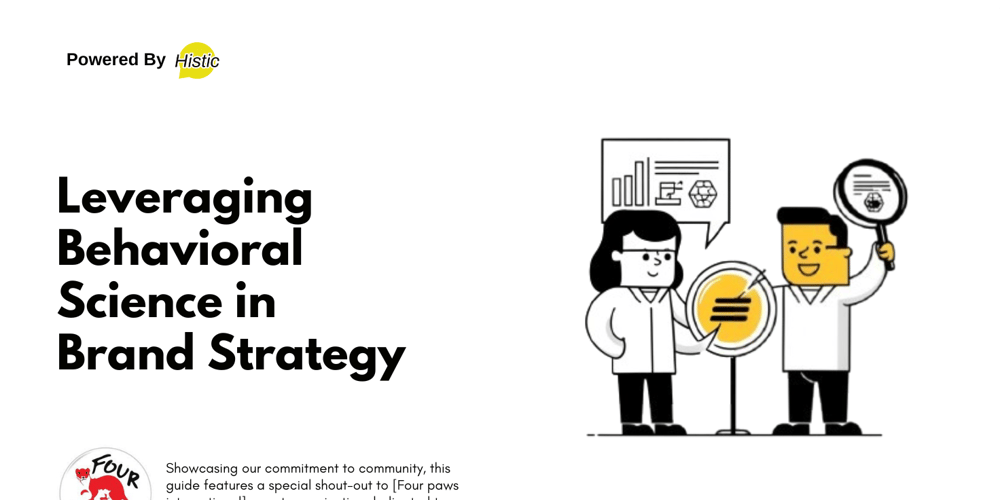Introduction
For decades, marketers have relied on traditional market research, demographic segmentation, and rational appeals to build brands. However, the reality is that human behavior is far from rational. We are driven by subconscious biases, emotional shortcuts, and deep-seated psychological tendencies that significantly influence our purchasing decisions. This is where behavioral science steps in. By understanding the underlying cognitive mechanisms that drive consumer choices, brands can move beyond traditional methods and craft strategies that are not only more effective but also more deeply engaging and memorable.
This article explores how a deep understanding of behavioral science can be leveraged to create more powerful, persuasive, and ultimately, more successful brands. We will delve into specific cognitive biases and heuristics, illustrate their practical applications in branding, and discuss how to implement these insights ethically and effectively.
Part 1: Understanding the Landscape – The Irrational Consumer
- The Myth of the Rational Actor: We begin by dismantling the classical economic assumption of perfectly rational consumers. The human mind is prone to errors, influenced by emotions, and shaped by context. We introduce the concept of “bounded rationality,” acknowledging that consumers make decisions with limited information, processing power, and time.
-
The Power of Heuristics: Heuristics are mental shortcuts that simplify decision-making. While useful, they often lead to predictable biases. We’ll explore several prominent heuristics:
- Availability Heuristic: Decisions are influenced by information that’s readily available in memory. Recent or vivid experiences disproportionately impact choices.
- Representativeness Heuristic: We categorize and judge things based on how well they fit our pre-existing mental models.
- Anchoring Heuristic: The first piece of information we receive (the anchor) significantly influences subsequent judgments, even if irrelevant.
-
The Realm of Cognitive Biases: These systematic errors in thinking can skew judgment and lead to predictable patterns of behavior. Key biases we’ll explore include:
- Confirmation Bias: The tendency to seek out and interpret information that confirms existing beliefs.
- Loss Aversion: The pain of a loss is psychologically more powerful than the pleasure of an equivalent gain.
- Framing Effect: How information is presented significantly impacts decisions, even if the underlying facts are the same.
- Social Proof: We tend to conform to the behavior of others, particularly those we perceive as similar to us.
- Scarcity Effect: Things become more desirable when they are perceived as rare or limited.
-
The Emotional Core: We move beyond purely cognitive processes to emphasize the powerful role of emotions in driving brand preference and loyalty. We will discuss the neurological basis of emotions, how they influence decision-making, and how brands can tap into specific emotional drivers (e.g., nostalgia, pride, belonging).
Part 2: Applying Behavioral Science to Brand Strategy – From Theory to Practice
This section will demonstrate practical applications of behavioral science principles in various aspects of brand strategy:
Part 3: Implementation and Ethical Considerations
- Research and Testing: Emphasizing the importance of rigorously testing assumptions and measuring the impact of behavioral science-informed interventions.
- A/B Testing and Iteration: Advocating for a data-driven approach that constantly refines strategies based on real-world results.
- Ethical Implications: Addressing the potential for misuse of behavioral science principles and emphasizing the importance of transparency and ethical conduct. We will explore the concept of “dark patterns” and advocate for responsible application of these techniques.
- Building a Behavioral Science Mindset: Encouraging brands to cultivate a culture of experimentation and learning, fostering a deeper understanding of consumer psychology across all levels of the organization.
Conclusion
The era of the rational consumer is over. In today’s complex and attention-scarce world, understanding the irrationalities of human behavior is no longer a nice-to-have, it’s a competitive imperative. By embracing the power of behavioral science, brands can move beyond surface-level tactics and build truly resonant connections with their target audiences. This requires a commitment to rigorous research, ethical implementation, and a constant willingness to learn and adapt. Brands that master this paradigm shift will not only achieve greater success but also contribute to a more meaningful and engaging experience for their consumers.
Call to Action
This is not just a theoretical exercise. We encourage you to actively explore how these insights can be applied within your own brand strategy. Start experimenting, measure your results, and embrace the power of understanding the irrational consumer. The future of branding is deeply rooted in the fascinating realm of behavioral science.
Further Reading and Resources:
- Include links to relevant books, articles, and academic research in behavioral science.
- Highlight organizations and individuals who are leading the way in applying behavioral insights in business.
This in-depth article provides a comprehensive overview of the intersection of behavioral science and brand strategy. By delving into the cognitive processes that drive consumer behavior, and providing practical examples of how to apply these insights, it serves as a roadmap for brands seeking to build more effective, resonant, and ultimately, more successful strategies. Remember, the most impactful brands are the ones that understand the irrationality of their consumers and use that knowledge to their advantage.
LINKEDIN – UMESH THARUKA MALAVIARACHCHI

